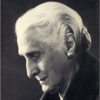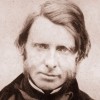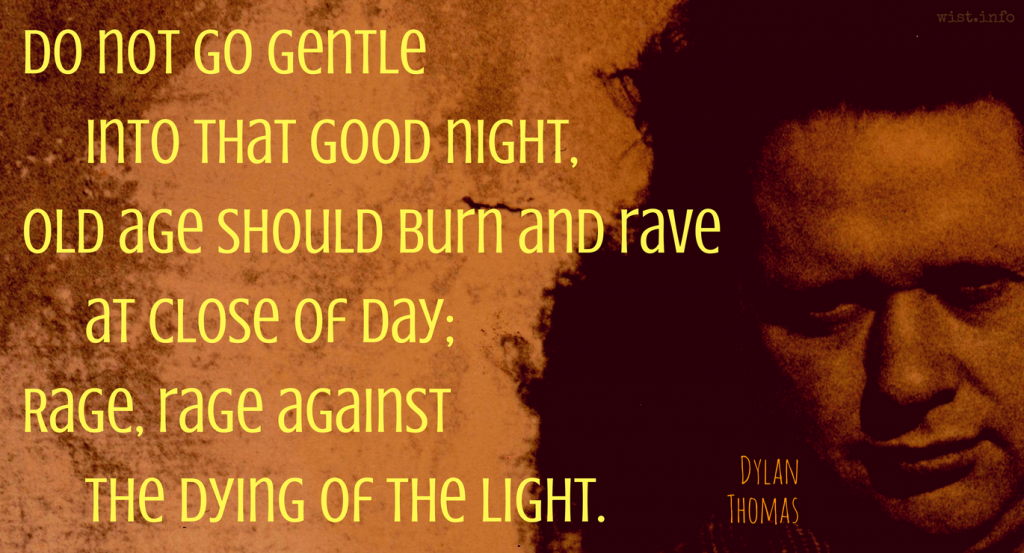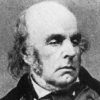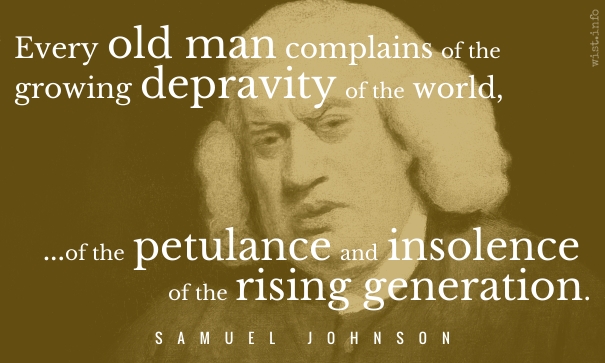The first symptom is that hair grows on your ears. It’s very disconcerting.
Edward G. Robinson (1893-1973) American stage and film actor [b. Emanuel Goldenberg]
All My Yesterdays: An Autobiography, “Epilogue” (1973) [with Leonard Spigelgass]
(Source)
On growing old.
Quotations about:
henoed
Note not all quotations have been tagged, so Search may find additional quotes on this topic.
We take all things in a minor key as we grow older. There are few majestic passages in the later acts of life’s opera. Ambition takes a less ambitious aim. Honor becomes more reasonable and conveniently adapts itself to circumstances. And love — love dies. “Irreverence for the dreams of youth” soon creeps like a killing frost upon our hearts. The tender shoots and the expanding flowers are nipped and withered, and of a vine that yearned to stretch its tendrils round the world there is left but a sapless stump.
Jerome K. Jerome (1859-1927) English writer, humorist [Jerome Klapka Jerome]
Idle Thoughts of an Idle Fellow, “On Being In Love” (1886)
(Source)
The quoted line is from Longfellow, "The Ladder of St. Augustine."
Perhaps being old is having lighted rooms
Inside your head, and having people in them, acting.
People you know, yet can’t quite name.Philip Larkin (1922-1985) English poet, novelist, librarian
“The Old Fools,” High Windows (1974)
(Source)
Old age isn’t so bad when you consider the alternative.
Maurice Chevalier (1888-1972) French singer, actor, entertainer
(Attributed)
Attributed in James B. Simpson, Contemporary Quotations (1964 ed.) (though not showing up in later editions), citing New York Times (1960-10-09). I could not find the reference in the Times online archives, and Respectfully Quoted: A Dictionary of Quotations (1989) treats it as "Unverified."
Quote Investigator finds evidence Chevalier used the line as of 1959, but finds evidence of anonymous / filler use of it or close variants as early as 1952. He tracks multiple references, including attributions to Chevalier.
Old age is like an opium-dream. Nothing seems real except what is unreal.
Oliver Wendell Holmes, Sr. (1809-1894) American poet, essayist, scholar
Over the Teacups, ch. 2 “To the Reader” (1891)
(Source)
The years swarm around me like midges, and though each tiny bite only costs me a single drop of blood, they are so thick I am nearly bled dry.
Stephen L. Burns (b. 1953) American author
“Redeemer’s Riddle,” Sword and Sorceress IV (1987) [ed. Marion Zimmer Bradley]
(Source)
Old age is like learning a new profession. And not one of your own choosing.
Jacques Barzun (1907-2012) French-American historian, educator, polymath
In Arthur Krystal, “Age of Reason,” The New Yorker (2007-10-15)
(Source)
Why do we get older? Why do our bodies wear out? Why can’t we just go on and on and on, accumulating a potentially infinite number of Frequent Flier mileage points? These are the kinds of questions that philosophers have been asking ever since they realized that being a philosopher did not involve any heavy lifting.
And yet the answer is really very simple: Our bodies are mechanical devices, and like all mechanical devices, they break down. Some devices, such as battery-operated toys costing $39.95, break down almost instantly upon exposure to the Earth’s atmosphere. Other devices, such as stereo systems owned by your next-door neighbor’s 13-year-old son who likes to listen to bands with names like “Nerve Damage” at a volume capable of disintegrating limestone, will continue to function perfectly for many years, even if you hit them with an ax. But the fundamental law of physics is that sooner or later every mechanism ceases to function for one reason or another, and it is never covered under the warranty.Dave Barry (b. 1947) American humorist
Dave Barry Turns 40, ch. 2 “Your Disintegrating Body” (1990)
(Source)
LEAR: Pray do not mock:
I am a very foolish fond old man,
Fourscore and upward, not an hour more nor less,
And to deal plainly,
I fear I am not in my perfect mind.William Shakespeare (1564-1616) English dramatist and poet
King Lear, Act 4, sc. 7, l. 68ff (4.7.68-72) (1606)
(Source)
Age imprints more wrinkles in the mind than it does on the face; and souls are never, or very rarely seen, that, in growing old, do not smell sour and musty.
[Elle nous attache plus de rides en l’esprit qu’au visage : et ne se void point d’ames, ou fort rares, qui en vieillissant ne sentent l’aigre et le moisi.]Michel de Montaigne (1533-1592) French essayist
Essays, Book 3, ch. 2 “Of Repentance [Du Repentir]” (1586) (3.2) (1595) [tr. Cotton/Hazlitt (1877)]
(Source)
Montaigne wrote this around age 60.
(Source (French)). Alternate translations:
[Age] sets more wrinckles in our mindes, then on our foreheads: nor are there any spirits, or very rare ones, which in growing olde taste not sowrelie and mustilie.
[tr. Florio (1603)]
Age imprints more wrinkles in the Mind, than it does in the Face, and Souls are never, or very rarely seen, that in growing old do not smell sour and musty.
[tr. Cotton (1686)]
[Old age] imprints more wrinkles in our mind than on our face; and there are to be seen few souls which, as they grow old, do not become sour and peevish.
[tr. Ives (1925)]
Old age puts more wrinkles in our minds than on our faces; and we never, or rarely, see a soul that in growing old does not come to smell sour and musty.
[tr. Frame (1943)]
Age sets more wrinkles on our minds than on our faces. You can find no souls -- or very few -- which as they grow old do not stink of rankness and of rot.
[tr. Screech (1987)]
One ov the most diffikult, and at the sametime one ov the most necessary, things for us old phellows to know, is that we aint ov so mutch ackount now az we waz.
[One of the most difficult, and at the same time one of the most necessary, things for us old fellows to know, is that we aren’t of so much account now as we were.]Josh Billings (1818-1885) American humorist, aphorist [pseud. of Henry Wheeler Shaw]
Everybody’s Friend, Or; Josh Billing’s Encyclopedia and Proverbial Philosophy of Wit and Humor, ch. 131 “Affurisms: Plum Pits (1)” (1874)
(Source)
A person who lacks the means, within himself, to live a good and happy life will find any period of his existence wearisome. But rely for life’s blessings on your own resources, and you will not take a gloomy view of any of the inevitable consequences of nature’s laws. Everyone hopes to attain an advanced age; yet when it comes they all complain! So foolishly inconsistent and perverse can people be.
[Quibus enim nihil est in ipsis opis ad bene beateque vivendum, eis omnis aetas gravis est; qui autem omnia bona a se ipsi petunt, eis nihil malum potest videri quod naturae necessitas adferat. Quo in genere est in primis senectus, quam ut adipiscantur omnes optant, eandem accusant adeptam; tanta est stultitiae inconstantia atque perversitas.]
Marcus Tullius Cicero (106-43 BC) Roman orator, statesman, philosopher
De Senectute [Cato Maior; On Old Age], ch. 2 / sec. 4 (2.4) [Cato] (44 BC) [tr. Grant (1960, 1971 ed.)]
(Source)
(Source (Latin)). Alternate translations:
For eche of thies ages which men name Childhode, adolescence, yongth, virilite, manhode & olde age semyn to be hevy & noxous to men the which in them silf have nothyng that may help & socoure them to lyve goodly & blessidly as bee, the which excercisen sciences & vertues & good werkis, but as to suche men which sechyn & fyndyn in themsilf alle the goods & thyngis which belongyn wele & blessidly for to lyve, ther is nothyng that comyth to them in age by the defaute of nature that may seme unto them evyll nor noxous. It is certayne that olde age is suche that it serchith & fyndyth in it self all the goodnesses whch longen to live wel & blyssidly, and yet is olde age such that alle men desyre to come untyll hit, And never the lesse the mutablenes & evyl dysposicion of men it is so grete in oure dayes that they blamyn olde age whan they be come therto by cause that then they may not use delectacions.
[tr. Worcester/Worcester/Scrope (1481)]
For they that have no power, pith of wit, help, way nor virtue in themselves to conduct and bring them to a good and blessed life, unto such as these be, all their age is cumbersome and unpleasant. But unto such as lead their lives virtuously, measuring all their actions by the square of reason, and have their minds with all good gifts of grace beautified and garnished, there is nothing thought nor deemed evil that cometh by necessity of nature. Of the which sort old age is principally to be considered, unto which all men wish to arrive, and yet when they have their desire, they accuse it as painful, sickly, unpleasant and tedious, such is the brainless unconstancy, foolish sottage, and perverse overthwartness of wayward people.
[tr. Newton (1569)]
For that age is only grievous to those that have no taste of wisdome and learning in themselves to make them live happily: but to them which see all perfection and consolation from their own experience, nothing can seem heavy which the necessity of nature bringeth: of which sort old age is chief, which all desire to obtain, and blame being obtained; such is their unconstancy, foolishnesse and perversity.
[tr. Austin (1648)]
For to those who have nothing within themselves capable of making Life happy, and satisfactory, no wonder if every Stage of it should prove irksome, and vexatious: but, to those who derive all their satisfaction from an easy mind, nothing can seem grievous and tormenting, that proceeds from the irreversible Laws of Nature; which certainly is the case of Old Age,, whereunto though 'tis the earnest desire of all men to arrive, yet such is their unaccountable folly, and perverseness, that they are never more uneasy than when they have arrived at it.
[tr. Hemming (1716)]
All Ages are grievous to those who have not in themselves the Means of living Holy and Happy; but those who expect all Happiness from their own Virtues, don't look up on the Decay of Nature as a Hardship, whereof Old Age is the chiefest, and which all desire to attain to; but is no sooner tasted than declaim'd against. Such are the Effects of Inconstancy, Folly, and the Want of Wisdom.
[tr. J. D. (1744)]
For know this, that those who have no Aid or Support within themselves, to render their Lives easy, will find every State irksome: While such as are convinced, they must owe their Happiness to themselves, and that if they cannot find it in their own Breasts, they will never meet with it from abroad; will never consider any thing as an Evil, that is but a necessary Effect of the established Order of Nature; which Old Age most undoubtedly is. 'Tis certainly strange, that while all Men hope they may live to attain it, any should find Fault with it, when it comes their Share. Yet such is the Levity, Folly, and Perverseness of Mankind, that we see there is nothing more common.
[tr. Logan (1744)]
Those indeed who have no internal resource of happiness, will find themselves uneasy in every stage of human life: but to him who is accustomed to derive all his felicity from within himself, no state will appear as a real evil into which he is conducted by the common and regular course of nature. Now this is peculiarly the case with respect to old age : yet such is the inconsistency of human folly, that the very period which at a distance is every man's warmest wish to attain, no sooner arrives than it is equally the object of his lamentations.
[tr. Melmoth (1773)]
For to those that have nought of resource in themselves for living well and happily, every stage of life is burthensome; while to those that seek all their goods from themselves, nothing can seem an evil, which the law of Nature may bring them. In which class foremost stands old age, which all desire to attain, but arraign the same when attained; so great is the inconsistency and perverseness of folly.
[Cornish Bros. ed. (1847)]
For to those who have no resource in themselves for living well and happily, every age is burdensome; but to those who seek all good things from themselves, nothing can appear evil which the necessity of nature entails; in which class particularly is old age, which all men wish to attain, and yet they complain of it when they have attained it; so great is the inconsistency and waywardness of folly.
[tr. Edmonds (1874)]
For those who have in themselves no resources for a good and happy life, every period of life is burdensome; but to those who seek all goods from within, nothing which comes in the course of nature can seem evil. Under this head a place especially belongs to old age, which all desire to attain, yet find fault with it when they have reached it. Such is the inconsistency and perverseness of human folly.
[tr. Peabody (1884)]
But those who look for all happiness from within can never think anything bad which nature makes inevitable. In that category before anything else comes old age, to which all wish to attain, and at which all grumble when attained. Such is Folly's inconsistency and unreasonableness!
[tr. Shuckburgh (1895)]
Of course
To those who've no resources in themselves
For a good and happy life, why, every age
Is hard to bear: but those who have within
All that is needful for a life well-spent,
Can never find misfortune in the lot
That nature's laws impose. And one such lot
Is that old age must come to each and all,
Old age so fondly hoped for, when it comes,
So Oft found to be irksome. Such, alas!
Is Folly's want of reason and resolve.
[tr. Allison (1916)]
For to those who have not the means within themselves of a virtuous and happy life every age is burdensome; and, on the other hand, to those who seek all good from themselves nothing can seem evil that the laws of nature inevitably impose. To this class old age especially belongs, which all men wish to attain and yet reproach when attained; such is the inconsistency and perversity of Folly!
[tr. Falconer (1923)]
People, you see, who have no inner resources for living the good and happy life, find every age a burden. But men who seek all good from within themselves are simply unable to view as evil anything that comes about through nature’s law. Now old age, as much as anything else in this world, is such a thing. All men hope and pray to attain it; once they have attained it, they start finding fault with it.
[tr. Copley (1967)]
Some people just do not possess the optimism that would allow them to live contentedly under any circumstances: for them every stage of life is a burden. But if only they expected nothing but good for themselves, nothing that the natural passage of time brought them could seem bad. This is especially true of old age. Everybody wants to live for a long time, but when they have attained their goal, they grumble. It makes no sense -- but that’s what life is: perverse and inconsistent.
[tr. Cobbold (2012)]
Someone who doesn't have much in the way of inner resources will find all stages of life irksome, but someone whose character is in order will accept what nature brings and not complain about something perfectly natural, calling it evil. There is much nonsense bandied about old age, something which everyone wishes to reach, but which most complain about once they get there. That seems more than slightly inconsistent and perverse, doesn't it?
[tr. Gerberding (2014)]
They find every age oppressive, of course,
Who in their inner selves have no resource
To live an easy life in happiness,
But they who in themselves only find
Their own contentment and peace of mind
See no harm in nature’s due process
Whose termination inevitably
May lead to that state of senility
To which they keenly lay claim,
But once attained rather foolishly,
With malice and incongruity,
Promptly find reasons to blame.
[tr. Bozzi (2015)]
Those who lack within themselves the means for living a blessed and happy life will find any age painful. But for those who seek good things within themselves, nothing imposed on them by nature will seem troublesome. Growing older is a prime example of this. Everyone hopes to reach old age, but when it comes, most of us complain about it. People can be so foolish and inconsistent.
[tr. Freeman (2016)]
Every age is burdensome to those who have no means of living well and happily. But to those who seek all good from themselves, nothing which the necessity of nature offers can appear bad. Old age is a prime example of this sort of thing -- everyone wishes to attain it, but they always complain about it once it is attained. Such is the inconstancy and perversity of stupidity.
[tr. Robinson [@sentantiq] (2017)]
Why then do I spend so many words on the subject of pleasure? Why, because, far from being a charge against old age, that it does not much feel the want of any pleasures, it is its highest praise. But, you will say, it is deprived of the pleasures of the table, the heaped up board, the rapid passing of the wine-cup. Well, then, it is also free from headache, disordered digestion, broken sleep. But if we must grant pleasure something, since we do not find it easy to resist its charms, — for Plato, with happy inspiration, calls pleasure “vice’s bait,” because of course men are caught by it as fish by a hook, — yet, although old age has to abstain from extravagant banquets, it is still capable of enjoying modest festivities.
[Quorsum igitur tam multa de voluptate? Quia non modo vituperatio nulla, sed etiam summa laus senectutis est, quod ea voluptates nullas magno opere desiderat. Caret epulis exstructisque mensis et frequentibus poculis. Caret ergo etiam vinulentia et cruditate et insomniis. Sed si aliquid dandum est voluptati, quoniam eius blanditiis non facile obsistimus, divine enim Plato “escam malorum” appellat voluptatem quod ea videlicet homines capiantur ut pisces, quamquam immoderatis epulis caret senectus, modicis tamen conviviis delectari potest.]Marcus Tullius Cicero (106-43 BC) Roman orator, statesman, philosopher
De Senectute [Cato Maior; On Old Age], ch. 13 / sec. 44 (13.44) (44 BC) [tr. Shuckburgh (1895)]
(Source)
The reference to Plato is to Timaeus, 69D: "κακοῦ δέλεαρ".
(Source (Latin)). Alternate translations:
Therfor thene ye may aske and demaunde why I haue said so many thynges of flesshely delyte and of lecherye, wherfor I answere you that the blame and the shame is not onely ynoughe. But namely it is the grete lawde and praysyng of olde age that it desyreth but lytle flesshely delectacyons. Olde age chargith nevir of dyetes nor of dyvers deynty metys nor of tables richely and dyversly arrayde nor of many dyners drynkys. Olde age wille not be fulle of wyn often for doubte of sekenes. Olde age wille not suffre the akyng of the bely as is the colyk or of the stone or costyfnes whiche comyth of takyng so muche mete and so often that it abideth rawe within the stomake. Olde age desyrith not wakyng in the tyme that nature hath ordeyned to slepe. Albeit an aged man is gretly disposed to wake ayenst his will forsoth the philosopher Platon whiche spake dyversly in a mater that delectacyon at∣tempted by euill disposed men that leyen the baite & the snare to delite aged men in repleccion of lustis & metys not helefull to them & bycause that men be taken & decevued by the baite sett in the hoke or angle as the bird is taken in the snare how be it that olde age wolde have no metys ne his etyngys excessiuely. Algatys they may delite in deynte metys and in smale feedyngys and temperate dyete.
[tr. Worcester/Worcester/Scrope (1481)]
But to what purpose do we speak so much of pleasure? Verily, to the intent that hereby it may be seen and proved, how that it cannot only not be objected to old age for any vituperation and dispraise, but rather for a singular praise and commendation; because old-age doth not esteem nor care for these pleasures. But some other will say: It lacketh sumptuous fare, costly dishes, delicate viands, and drinks of all sorts. Hereto I answer tihat, therefore, it lacketh also drunkenness, crudity, or indigestion, fantastical dreams, and ridiculous apparitions. But if we must any whit yield to to pleasure because we cannot easily resist the blandishments and allurements thereof (for the divine philosopher Plato calleth pleasure the bait of all mischief, because men therewith are caught and snared even as fishes are with the hook), I say, that although old age be not endangered nor given to superfluous and immoderate banqueting, and at unseasonable hours, yet in temperate and moderate feasting it may be solaced and comfortably recreated.
[tr. Newton (1569)]
But to what end speak we so much of pleasure? because that you may see that no blame, but much praise is to be given to age, because it doth not lust after pleasure, which is so dangerous a thing. Age wanteth banquetting, gluttony, and quaffing; it is also without surfeting, drunkennesse, or dreaming; but yet if we may any wayes take some pleasure, because we do not easily resist her flatteries (for divine Plato calleth pleasure the bait of evils, because men are caught ther∣with as fishes with a hook) tho age despiseth immoderate banquets, yet may it be delighted with moderate meetings.
[tr. Austin (1648), ch. 12-13]
Then to our age (when not to pleasures bent)
This seems an honour, not disparagement.
We, not all pleasures like the Stoicks hate;
But love and seek those which are moderate.
(Though Divine Plato thus of pleasures thought,
They us, with hooks and baits, like fishes caught.)
[tr. Denham (1669)]
I have dwelt the longer on this Topick of bodily Pleasures, to shew, it is so far from being a Disparagement to our Age, to be deprived of these Enjoyments, that it is its greatest Praise and Commendation, that it even takes off our Inclinations from the violent Pursuit of them. Though we may not indulge our selves so freely in our Cups, though we do not relish the Pleasures of the most luxurious Provisions, will not our being freed from the fatal Consequences of Indigestion, and a disordered Imagination, make us ample amends? But if we must make some Allowances for Pleasure, and submit to its Blandishments (which Plato calls the Bait of humane Miseries, with which like Fishes we are tempted to the Hook). Though we are deprived of the Pleasure of immoderate Feasting, yet can we still relish the Charms of an agreeable and chearful Entertainment; which arises not from the Delicacy or Variety of Courses, but from the Conversation of the Company.
[tr. Hemming (1716)]
And why all this of Pleasure? Because not only to over-rule the Objection, but to shew that it is the greatest Encomium on Old Age, that he never ardently desires what we call Pleasure. Doth Age want Banquets, great Tables, and frequent Use of Wine? Confequently it is free from Drunkenness, Surfeits, and watchful Nights. But if we are any ways to give ourselves up to Pleasure, because we cannot altogether attend her Invitations, as Plato says, who calls it "a Bait for Evil, and that Men are taken with it as Fishes with a Hook," yet Old Age will abstain from Revelling, and take Delight only in moderate Entertainments.
[tr. J. D. (1744)]
Thus I judged it necessary to be the more full on this Head of Pleasure, and shew the Dangers of it, to the end you might clearly see, it is so far from being a Disadvantage to Old-Age, its Palling our Inclinations to Pleasure, that on the contrary it is rather a great and valuable Blessing. For if it is in a good Measure dead to the Enjoyments others find in Banqueting, sumptuous Feasts and Carousings, it is freed at the same time from all the troublesome Effects of these; as Fumes, Crudities, uneasy Sleep, or the want of it; with divers other such like Disorders. Yet as Nature has so ordered it, that Pleasure should have a very strong Hold of us, and the Inclination to it appears deeply founded in our very Composition, (and 'tis with too much Justice that the divine Plato calls it the Bait of Evil, by which Men are caught as Fish with a Hook) therefore, though Age is not taken, nor can well bear, with those splendid sumptuous Feastings and Revels, yet we are not so insensible to the Pleasures of Life, but that we can indulge ourselves, and take a real Delight in sober and temperate Entertainments with our Friends.
[tr. Logan (1744)]
I have dwelt the longer upon this article, in order to convince you, that the little relish which old age leaves us for enjoyments of the sensual kind, is so far from being a just imputation on this period of life, that on the contrary it very considerably raises its value. If age render us incapable of taking an equal share in the flowing cups, and luxuriant dishes of splendid tables, it secures us too from their unhappy consequences -- from painful indigestions, restless nights, and disordered reason. Accordingly, the divine Plato justly represents pleasure as the bait by which vice ensnares and captivates her deluded votaries. But if this enticement cannot always be resisted, if the palate must sometimes be indulged, I do not scruple to say that an old man, although his years will guard him from excess, is by no means excluded from enjoying, in a moderate degree, the convivial gratifications.
[tr. Melmoth (1773)]
With what view then do I say so much about pleasure? Because not only is it no ground of censure, but even the highest praise of old age, that it desires no pleasures very much. But is old age without feasts, and loaded tables, and frequent cups? Therefore it is without drunkenness, and indigestion and troubled sleep. But if something must be given to pleasure, since we do not easily withstand its blandishments, (for divinely Plato calls pleasure the bait of evils, because evidently men are taken by it as fishes by a hook,) though old age is debarred immoderate feasts, yet, it may be gratified with temperate socialities.
[Cornish Bros. ed. (1847)]
To what end then have I said so many things about pleasure? Because it is so far from being any disparagement, that it is even the highest praise to old age, that it has no great desire for any pleasures. It lacks banquets, and piled up boards, and fast-coming goblets; it is therefore also free from drunkenness and indigestion and sleeplessness. But if something must be conceded to pleasure (since we do not easily withstand its allurements, for Plato beautifully calls pleasure the bait of evils, inasmuch as, by it, in fact, men are caught as fishes with a hook), although old age has nothing to do with extravagant banquets, yet in reasonable entertainments it can experience pleasure.
[tr. Edmonds (1874)]
But to what purpose am I saying so much about pleasure? Because it is not only no reproach to old age, but even its highest merit, that it does not severely feel the loss of bodily pleasures. But, you may say, it must dispense with sumptuous feasts, and loaded tables, and oft-drained cups. True, but it equally dispenses with sottishness, and indigestion, and troubled dreams. But if any license is to be given to pleasure, seeing that we do not easily resist its allurements, -- insomuch that Plato calls pleasure the bait of evil, because, forsooth, men are caught by it as fishes by the hook, -- old age, while it dispenses with excessive feasting, yet can find delight in moderate conviviality.
[tr. Peabody (1884)]
But why so much of pleasure? Why, you see,
Not only is it no disgrace to age,
But ev'n its greatest merit that it longs
No more for pleasure, cares no more for feasts
With loaded tables and o'er-flowing wine.
It misses too the headache, and the night
Of sickness and of sleeplessness that comes.
If something we must grant to pleasure's claim:
(It is not easy to resist its charm:
The godlike Plato thinks it is a bait
To catch the foolish, just as fish are caught:)
Though we cannot indulge in gorgeous feasts,
A modest dinner we can still enjoy.
[tr. Allison (1916)]
Why then, do I dwell at such length on pleasure? Because the fact that old age feels little longing for sensual pleasures not only is no cause for reproach, but rather is ground for the highest praise. Old age lacks the heavy banquet, the loaded table, and the oft-filled cup; therefore it also lacks drunkenness, indigestion, and loss of sleep. But if some concession must be made to pleasure, since her allurements are difficult to resist, and she is, as Plato happily says, “the bait of sin,” -- evidently because men are caught therewith like fish -- then I admit that old age, though it lacks immoderate banquets, may find delight in temperate repasts.
[tr. Falconer (1923)]
Why then do I have so much to say about pleasures of this kind? Because the weakening of temptation to indulge in them, far from supplying a pretext to reproach old age, is a reason for offering it the most cordial complements. Age has no banquets, no tables piled high, no cups filled again and again. So it avoids drunkenness, and indigestion, and sleepless nights! However, the allurements of pleasure are admittedly hard to resist; they are "the bait of sin," as Plato brilliantly calls them, which catch men like fish. If, then, we have to make them some concession, there is no reason why old age, though spared extravagant feasting, should not gratify itself with entertainments of a more modest nature.
[tr. Grant (1960, 1971 ed.)]
Why am I dwelling at such length on pleasure? Because it is not only no condemnation of old age, but rather its highest recommendation, that it feels no overwhelming desire for pleasure. The old do not share in banquets, in tables piled high with food, and in endless toasts; as a consequence, they do not share in drunkenness, in indigestion, and in sleeplessness. But if we must make some concession to pleasure, since we do not easily resist its blandishments (in a moment of inspiration Plato called pleasure “the bait of evil” -- obviously because men are caught by it like fish) -- even though the old do not share in unrestrained high life, still they can derive pleasure from moderate conviviality.
[tr. Copley (1967)]
Why do I go on so much about pleasure? As old men, we should not so much resent our age as praise it in the most glowing terms, because now we cannot feel any more interest in sensual temptations. As old men, we no longer attend formal banquets at tables loaded down with delicious food and wine; but on the other hand we no longer suffer from hangovers and indigestion and insomnia. But even so it may be hard to resist temptation completely. Plato cleverly referred to pleasure as “sin-bait,” because men are caught by it like fishes. There is, then, in our old age, nothing wrong with spending a convivial evening with friends, although we will not indulge ourselves to excess.
[tr. Cobbold (2012)]
So why am I going on and on about pleasure? Because I want to impress upon you how the fact that old age is less subject to the passions for pleasure is not an indictment of this stage of life, but actually one of its greatest advantages. If it lacks allnight parties, or tables heaped hy with rich food and powerful dirnk, it also lacks drunkenness, indigestion, insomnia, and "the morning after." It is not that old age lacks pleasures, it is that they change. And they are healthier. Gone are the overindulgent feasts and in their place we take pleasure in delightful dinner parties.
[tr. Gerberding (2014)]
So why do I tarry on pleasure’s enticement?
The fact that old age has no longing for it
Not only can’t be taken as a demerit,
But on the contrary is the best of credits.
Freedom from decked tables, from banquets
And also from frequent potations
Means freedom from drunkenness,
From insomnia and indigestions.
But we’re bound to make some concessions
To better resist pleasure’s alluring snares
Which Plato calls the bait of transgressions,
By which like fish men are caught unawares.
Although old age sumptuous banquets must shun
In light repasts it finds indeed some fun.
[tr. Bozzi (2015)]
The more the pleasures of the body fade away, the greater to me is the pleasure and charm of conversation.
Plato (c.428-347 BC) Greek philosopher
The Republic [Πολιτεία], Book 1 (c. 375 BC) [tr. Jowett (1871)]
(Source)
Socrates recounting something said to him by Cephalus.
Old age is a special problem for me because I’ve never been able to shed the mental image I have of myself — a lad of about nineteen.
E. B. White (1899-1985) American author, critic, humorist [Elwyn Brooks White]
“E. B. White: Notes and Comment by Author,” interview by Israel Shenker, New York Times (1969-07-11)
(Source)
On his 70th birthday.
Then Old Age said again, — Come, let us walk down the street together, — and offered me a cane, an eyeglass, a tippet, and a pair of over-shoes. — No, much obliged to you, said I. I don’t want those things, and I had a little rather talk with you here, privately, in my study. So I dressed myself up in a jaunty way and walked out alone; — got a fall, caught a cold, was laid up with a lumbago, and had time to think over this whole matter.
O misery! misery! Time eats our lives,
And that dark Enemy who gnaws our hearts
Grows by the blood he sucks from us, and thrives.[Ô douleur ! ô douleur ! Le Temps mange la vie,
Et l’obscur Ennemi qui nous ronge le cœur
Du sang que nous perdons croît et se fortifie!]Charles Baudelaire (1821-1867) French poet, essayist, art critic
Les Fleurs du Mal [The Flowers of Evil], # 10 “L’Ennemi [The Enemy],” st. 4 (1857) [tr. Squire (1909)]
(Source)
Also in 1861, 1868 eds. (Source (French)). Alternate translations:
Oh misery! -- Time devours our lives,
And the enemy black, which consumeth our hearts
On the blood of our bodies, increases and thrives!
[tr. Scott (1909)]
o grief! o grief! time eats away our lives,
and the dark Enemy gnawing at our hearts
sucks from our blood the strength whereon he thrives!
[tr. Shanks (1931)]
Oh, anguish, anguish! Time eats up all things alive;
And that unseen, dark Enemy, upon the spilled
Bright blood we could not spare, battens, and is fulfilled.
[tr. Millay (1936)]
Time swallows up our life, O ruthless rigour!
And the dark foe that nibbles our heart's root,
Grows on our blood the stronger and the bigger!
[tr. Campbell (1952)]
Alas! Alas! Time eats away our lives,
And the hidden Enemy who gnaws at our hearts
Grows by drawing strength from the blood we lose!
[tr. Aggeler (1954)]
Time and nature sluice away our lives.
A virus eats the heart out of our sides,
digs in and multiplies on our lost blood.
[tr. Lowell (1963), "The Ruined Garden"]
О grief! О grief! Time eats away life,
And the dark Enemy who gnaws the heart
Grows and thrives on the blood we lose.
[tr. Fowlie (1964)]
Time consumes existence pain by pain,
and the hidden enemy that gnaws our heart
feeds on the blood we lose, and flourishes!
[tr. Howard (1982)]
I cry! I cry! Life feeds the seasons' maw
And that dark Enemy who gnaws our hearts
Battens on blood that drips into his jaws!
[tr. McGowan (1993)]
Time eats at life: no wonder we despair.
Our enemy feeds on the blood we lose.
He gnaws our heart, and look how strong he grows.
[tr. Lerner (1999)]
O pain! pain! Time devours life and the dark Enemy that gnaws our heart grows, and grows strong, from the blood we let.
[tr. Waldrop (2006)]
Neither lemonade nor anything else can prevent the inroads of old age. At present, I am stoical under its advances, and hope I shall remain so. I have but one prayer at heart; and that is, to have my faculties so far preserved that I can be useful, in some way or other, to the last.
Lydia Maria Child (1802-1880) American abolitionist, activist, journalist, suffragist
Letter to Harriet Seward (1869)
(Source)
I don’t need you to remind me of my age, I have a bladder to do that for me.
Stephen Fry (b. 1957) British actor, writer, comedian
“Trefusis Returns!” Paperweight (1992)
(Source)
Originally printed in The Daily Telegraph (c. 1990).
OLD AGE: I make it a rule never to force myself upon a person’s recognition until I have known him at least five years.
PROFESSOR: Do you mean to say that you have known me so long as that?
OLD AGE: I do. I left my card on you longer ago than that, but I am afraid you never read it; yet I see you have it with you.
PROFESSOR: Where?
OLD AGE: There, between your eyebrows, — three straight lines running up and down; all the probate courts know that token, — “Old Age, his mark.” Put your forefinger on the inner end of one eyebrow, and your middle finger on the inner end of the other eyebrow; now separate the fingers, and you will smooth out my sign-manual; that’s the way you used to look before I left my card on you.
A goodly fellow by his looks, though worn
As most good fellows are, by pain or pleasure,
Which tear life out of us before our time;
I scarce know which most quickly: but he seems
To have seen better days, as who has not
Who has seen yesterday?
KING OF FRANCE: For we are old, and on our quick’st decrees
Th’ inaudible and noiseless foot of time
Steals ere we can effect them.William Shakespeare (1564-1616) English dramatist and poet
All’s Well That Ends Well, Act 5, sc. 3, l. 48ff (5.3.48-50) (1602?)
(Source)
But our machines have now been running for 70. or 80. years, and we must expect that, worn as they are, here a pivot, there a wheel, now a pinion, next a spring, will be giving way: and however we may tinker them up for awhile, all will at length surcease motion. Our watches, with works of brass and steel, wear out within that period.
Thomas Jefferson (1743-1826) American political philosopher, polymath, statesman, US President (1801-09)
Letter to John Adams (5 Jul 1814)
(Source)
Jefferson (and Adams) lived another 12 years, both dying on 4 July 1826.
Age is no second childhood — age makes plain,
Children we were, true children we remain.[Das Alter macht nicht kindisch, wie man spricht,
Es findet uns nur noch als wahre Kinder.]Johann Wolfgang von Goethe (1749-1832) German poet, statesman, scientist
Faust: a Tragedy [eine Tragödie], Part 1, sc. 2 “Prelude on the Stage” / “Prelude at the Theatre,” l. 212ff [Merryman] (1808-1829) [tr. Luke (1987)]
(Source)
The character is identified as Lustige Person in the original, translated in various English sources as Merryman, Merryfellow, Merry Andrew, Jester, Comedian, and Clown.
Some translations (and this site) include the Declaration, Prelude on the Stage, and Prologue in Heaven as individual scenes; others do not , leading to their Part 1 scenes being numbered three lower.
(Source (German)). Alternate translations:
Age makes not childish, as one oft avers;
It finds us still true children merely.
[tr. Priest (1808)]
Old age does not make childish, as men say; it only finds us still as true children.
[tr. Hayward (1831)]
Age does not make us childish, as folk say,
It finds us genuine children e'en in eld.
[tr. Swanwick (1850)]
Age does not make us childish, as they say,
But we are still true children when it finds us.
[tr. Brooks (1868)]
Age childish makes, they say, but ’tis not true;
We’re only genuine children still, in Age’s season!
[tr. Taylor (1870)]
Old age, not childish, makes the old; but they
Are genuine children of a mellower day.
[tr. Blackie (1880)]
Old age not childish makes, whate'er one says;
It only finds us still as very children.
[tr. Latham (1908)]
Age does not make us childish, as we're told,
It merely finds we are still young at heart.
[tr. Kaufmann (1961)]
They say that age makes people childish;
I say it merely finds us still true children.
[tr. Salm (1962)]
Old age does not make childish, as they claim,
It merely finds us genuine children yet.
[tr. Arndt (1976)]
Age doesn't make us childish, God knows,
Just finds us the same old children still.
[tr. Greenberg (1992)]
They say age makes us childish - but it can
Make truer children of us than before.
[tr. Williams (1999)]
Age doesn’t make us childish, as they say,
It finds that we’re still children.
[tr. Kline (2003)]
JAQUES: [O]ne man in his time plays many parts,
His acts being seven ages. At first the infant,
Mewling and puking in the nurse’s arms.
Then the whining schoolboy with his satchel
And shining morning face, creeping like snail
Unwillingly to school. And then the lover,
Sighing like furnace, with a woeful ballad
Made to his mistress’ eyebrow. Then a soldier,
Full of strange oaths and bearded like the pard,
Jealous in honor, sudden and quick in quarrel,
Seeking the bubble reputation
Even in the cannon’s mouth. And then the justice,
In fair round belly with good capon lined,
With eyes severe and beard of formal cut,
Full of wise saws and modern instances;
And so he plays his part. The sixth age shifts
Into the lean and slippered pantaloon
With spectacles on nose and pouch on side,
His youthful hose, well saved, a world too wide
For his shrunk shank, and his big manly voice,
Turning again toward childish treble, pipes
And whistles in his sound. Last scene of all,
That ends this strange eventful history,
Is second childishness and mere oblivion,
Sans teeth, sans eyes, sans taste, sans everything.William Shakespeare (1564-1616) English dramatist and poet
As You Like It, Act 2, sc. 7, l. 149ff (2.7.149-173) (1599)
(Source)
What’s old age for if not dispensing bullshit and calling it wisdom?
John Quincy Adams is well, sir; quite well, I thank you. But the house in which he lives at the present time is becoming dilapidated. It’s tottering upon its foundations. Time and the seasons have nearly destroyed it. Its roof is pretty well worn out. Its walls are much shattered and tremble with every wind. The old tenement is becoming almost uninhabitable, and I think John Quincy Adams will have to move out of it soon. But he himself is quite well, sir; quite well.
John Quincy Adams (1767-1848) US President (1825-29)
(Attributed)
(Source)
When, at eighty years old, he was asked by a passer-by on the street, "How is John Quincy Adams today?" The anecdote is found with some frequency c. 1900, about fifty years after Adams' death in 1848, at that age.
As people age, they confuse changes in themselves with changes in the world, and changes in the world with moral decline — the illusion of the good old days. And so every generation believes that the kids today are degrading the language and taking civilization down with it.
Steven Pinker (b. 1954) Canadian-American cognitive psychologist, linguist, author
The Sense of Style, Prologue (2014)
(Source)
The years come when the mind, like an old mill, ceases to grind; when weeds grow on the wall; and through every crack and leak in dam and sluice, spouts the useless water.
Age is truly a time of heroic helplessness. One is confronted by one’s own incorrigibility. I am always saying to myself, “Look at you, and after a lifetime of trying.” I still have the vices that I have known and struggled with — well it seems like since birth. Many of them are modified, but not much. I can neither order nor command the hubbub of my mind.
Florida Scott-Maxwell (1883-1979) American-British playwright, author, psychologist
The Measure of My Days (1968)
(Source)
In a word, enjoy that blessing while you have it: when it is gone, do not lament it; unless, indeed, young men ought to lament the loss of boyhood, and those a little advanced in age the loss of adolescence.
[Denique isto bono utare, dum adsit, cum absit, ne requiras: nisi forte adulescentes pueritiam, paulum aetate progressi adulescentiam debent requirere.]
Marcus Tullius Cicero (106-43 BC) Roman orator, statesman, philosopher
De Senectute [Cato Maior; On Old Age], ch. 10 / sec. 33 (10.33) (44 BC) [tr. Edmonds (1874)]
(Source)
(Source (Latin)). Alternate translations:
Finally I tell the thou oughtist use of the bodily strength as whiche is one of the goodys of nature in the meane tyme whan thou hast them. But whan the goodys of bodily strength ben no more in thee thenne thou shuldist not require it nor aske it save that thou maist saye paraventure that the adolescentys which ben in the third age owghten to desyre & aske after the age of pueryce which is seconde age & by that he is the ferthir from deth. Therfor I tell the Scipion that when men ben somwhat entrid & come within adolescence which is an age fructuouse and profitable they to require it and to aske it. And not puerice called Childhode whiche is withoute availe and profite.
[tr. Worcester/Worcester/Scrope (1481), Part 3]
In fine, use and take well in worth this gift of bodily strength while thou hast it, and when it is gone do not desire nor seek to have it again, unless peradventure you will say that all young men ought to wish themselves in their infancy and swathing-bands again, or when they be somewhat further stricken in years and in the maturity or best time of their age, to wish themselves again in their adolescency.
[tr. Newton (1569)]
To conclude, use that strength which you have while you have it; but when it is gone, require it not, unlesse you thinke it a seemly thing of young men, to require their child-hood againe, and ancient men their youth.
[tr. Austin (1648)]
The force which Nature gives with care retain,
But when decay'd, 'tis folly to complain;
In age to wish for youth is full as vain,
As for a youth to turn a child again.
[tr. Denham (1669)]
The Faculties of our Bodies are to be made use of, while we possess them, but not to be lamented, when they have left us; unless you would think it reasonable that Boys should be desirous to become Children, and that those, who are become Men, should be wishing to grow Boys again.
[tr. Hemming (1716)]
In short, make use of any Good while you have it, and when it's gone look not for it, unless you think young Men would do right to require Childhood again, or Men in Years their Youth.
[tr. J. D. (1744)]
In short, while you have Strength, use it; when it leaves you, no more repine for the want of it, than you did when Lads, that your Childhood was past; or at the Years of Manhood, that you were no longer Boys.
[tr. Logan (1750)]
In a word, my friends, make a good use of your youthful vigour so long as it remains; but never let it cost you a sign when age shall have withdrawn it from you; as reasonably indeed might youth regret the loss of infancy, or manhood the extinction of youth.
[tr. Melmoth (1773)]
In a word, make use of that good thing while it is present; when it is absent do not regret it; unless, perhaps, young men ought to seek to be boys again; those who have made a little advance in years, to be young men again.
[Cornish Bros. ed. (1847)]
In fine, I would have you use strength of body while you have it: when it fails, I would not have you complain of its loss, unless you think it fitting for young men to regret their boyhood, or for those who have passed on a little farther in life to want their youth back again.
[tr. Peabody (1884)]
In fine, enjoy that blessing when you have it; when it is gone, don't wish it back -- unless we are to think that young men should wish their childhood back, and those somewhat older their youth!
[tr. Shuckburgh (1895)]
Use then the gifts you have:
When gone, regret them not: unless as men
You are to ask for boyhood to return,
When older ask for you: there still must be
A certain lapse of years.
[tr. Allison (1916)]
In short, enjoy the blessing of strength while you have it and do not bewail it when it is gone, unless, forsooth, you believe that youth must lament the loss of infancy, or early manhood the passing of youth.
[tr. Falconer (1923)]
To sum it up: use the advantages you have while you have them; when they are gone, don’t sit around wishing you could get them back. Or do you think, perhaps, that young men ought to mourn their lost boyhood, and those a bit older their younger days?
[tr. Copley (1967)]
Use whatever gifts you have while you have them, and don’t mope after them when they are gone -- unless of course you think that young men should regret their childhood and that those who are getting on should regret their youth.
[tr. Cobbold (2012)]
So to put it in a nutshell
Use your own strength and use it well
As long as it lasts and when it is spent
Just forget it unless you should
Think that boyhood regrets childhood
Or that manhood may its decline lament.
[tr. Bozzi (2015)]
In short, enjoy the blessing of bodily strength while you have it, but don't mourn when it passes away, any more than a young man should lament the end of boyhood, or a mature man the passing of youth.
[tr. Freeman (2016)]
Youth is full of sunshine and life. Youth is happy, because it has the ability to see beauty. When this ability is lost, wretched old age begins, decay, unhappiness. […] Anyone who keeps the ability to see beauty never grows old.
The crucial task of age is balance, a veritable tightrope of balance; keeping just well enough, just brave enough, just gay and interested and starkly honest enough to remain a sentient human being.
Florida Scott-Maxwell (1883-1979) American-British playwright, author, psychologist
The Measure of My Days (1968)
(Source)
The problem [with beauty] is that it’s like being born rich and getting poorer.
JUST DISCOURSE: Do not bandy words with your father, nor treat him as a dotard, nor reproach the old man, who has cherished you, with his age.
Aristophanes (c. 450-c. 388 BC) Athenian comedic playwright
Clouds, ll. 998-999 (423 BC) [tr. Athenian Soc. (1912)]
(Source)
Alt. trans.:
- JUST ΛΟΓΟΣ: "[Learn] not to contradict your father in any thing; nor by calling him Iapetus, to reproach him with the ills of age, by which you were reared in your infancy." [tr. Hickie (1853)]
- RIGHT LOGIC: "Nor dare to reply when your Father is nigh, nor 'musty old Japhet' to call / In your malice and rage that Sacred Old Age which lovingly cherished your youth." [tr. Rogers (1924)]
Life is not living, but living in health.
[Vita non est vivere, sed valere vita est.]
Martial (AD c.39-c.103) Spanish Roman poet, satirist, epigrammatist [Marcus Valerius Martialis]
Epigrams [Epigrammata], Book 6, epigram 70 (6.70.15) (AD 91) [tr. Ker (1919)]
(Source)
(Source (Latin)). Alternate translations:
It is not life to live, but to be well.
[tr. Burton (1621)]
Not all who live long, but happily, are old.
[tr. Killigrew (1695)]
For sense and reason tell,
That life is only life, when we are well.
[tr. Hay (1755)]
For life is not to live, but to be well.
[tr. Johnson, in The Rambler, #48, cited to Elphinston (1 Sep 1750)]
To brethe can just not dying give:
But, to be well, must be to live.
[tr. Elphinston (1782), 2.115]
For life is not simply living, but living in health.
[tr. Amos (1858)]
Life consists not in living, but in enjoying health.
[tr. Bohn's Classical (1859)]
It is not life to live, but to be well.
[ed. Harbottle (1897)]
The blunderer who deems them so,
Misreckons life and much mistakes it,
He thinks 'tis drawing breath -- we know
'Tis health alone that mars or makes it.
[tr. Pott & Wright (1921)]
Life is not life, but health is life indeed.
[tr. Francis & Tatum (1924), #310]
To live is not just life, but health.
[tr. Shepherd (1987)]
Life is not being alive, but being well.
[tr. Shackleton Bailey (1993)]
What do you suppose makes all men look back to the time of childhood with so much regret (if their childhood has been, in any moderate degree, healthy or peaceful)? That rich charm, which the least possession had for us, was in consequence of the poorness of our treasures. That miraculous aspect of the nature around us, was because we had seen little, and knew less. Each increased possession loads us with a new weariness; every piece of new knowledge diminishes the faculty of admiration; and Death is at last appointed to take us from a scene in which, if we were to stay longer, no gift could satisfy us, and no miracle surprise.
John Ruskin (1819-1900) English art critic, painter, writer, social thinker
The Eagle’s Nest, Lecture 5 “The Power of Contentment in Science and Art,” Sec. 82 (22 Feb 1872)
(Source)
Do not go gentle into that good night,
Old age should burn and rave at close of day;
Rage, rage against the dying of the light.Dylan Thomas (1914-1953) Welsh poet and writer
“Do Not Go Gentle into That Good Night” (1947)
(Source)
First published in Botteghe Oscure (Nov 1951).
When you are twenty years old, you will be a peacock; at thirty, a lion; at forty, a camel; at fifty, a serpent; at sixty, a dog; at seventy, a monkey; and at eighty, nothing..
[A los veinte años será pavón; a los treinta, león; a los cuarenta, camello; a los cincuenta, serpiente; a los sesenta, perro; a los setenta, mona; y a los ochenta, nada.]
Baltasar Gracián y Morales (1601-1658) Spanish Jesuit priest, writer, philosopher
The Art of Worldly Wisdom [Oráculo Manual y Arte de Prudencia], § 276 (1647) [tr. Maurer (1992)]
(Source)
(Source (Spanish)). Alternate translations:
At twenty years of age a Peacock; at thirty a Lion; at fourty a Camel; at fifty a Serpent; at sixty a Dog; at seventy an Ape; at fourscore nothing at all.
[Flesher ed. (1685)]
At twenty a man is a Peacock, at thirty a Lion, at forty a Camel, at fifty a Serpent, at sixty a Dog, at seventy an Ape, at eighty nothing.
[tr. Jacobs (1892)]
At twenty, man is a peacock, at thirty a lion, at forty a camel, at fifty a snake, at sixty a dog, at seventy an ape, and at eighty, nothing.
[tr. Fischer (1937)]
I miss what I had in terms of the speed of memory access. If I needed a word or a fact it was already at my fingertips and now it’s like an arthritic and elderly gentleman has to sit up and go down many, many flights of stairs very slowly and go and rummage in dusty drawers. Eventually he will return four days later, normally at about 1:30 in the morning, and I will sit up and go, “Oh yes! ‘Crepuscular.’ That was the word I was looking for.”
Neil Gaiman (b. 1960) British author, screenwriter, fabulist
“This Much I Know,” The Guardian (5 Aug 2017)
(Source)
Leave well — even “pretty well” — alone: that is what I learn as I get old.
Edward FitzGerald (1809-1883) English writer, poet, translator
Letter to W. F. Pollock (7 Dec 1869)
(Source)
Our ancestors used to wear decent clothes, well-adapted to the shape of their bodies; they were skilled horsemen and swift runners, ready for all seemly undertakings. But in these days the old customs have almost wholly given way to new fads. Our wanton youth is sunk in effeminacy, and courtiers, fawning, seek the favors of women with every kind of lewdness. […] They sweep the dusty ground with the unnecessary trains of their robes and mantles; their long, wide sleeves cover their hands whatever they do; impeded by these frivolities they are almost incapable of walking quickly or doing any kind of useful work.
Orderic Vitalis (1075-c. 1142) English monk, chronicler
Historia Ecclesiastica, Book 4 [tr. Chibnall (1969-80)]
Alt. trans.: "Our ancestors used to wear decent clothes, nicely fitted to the shape of their bodies and suitable for riding and running and performing every task that they should reasonably perform. But in these wicked days the practices of olden times have almost completely given way to novel fads."
Am I the person who used to wake in the middle of the night and laugh with the joy of living? Who worried about the existence of God, and danced with young ladies till long after daybreak? Who sang “Auld Lang Syne” and howled with sentiment, and more than once gazed at the full moon through a blur of great, romantic tears?
Every old man complains of the growing depravity of the world, of the petulance and insolence of the rising generation. He recounts the decency and regularity of former times, and celebrates the discipline and sobriety of the age in which his youth was passed; a happy age which is now no more to be expected, since confusion has broken in upon the world, and thrown down all the boundaries of civility and reverence.
Samuel Johnson (1709-1784) English writer, lexicographer, critic
The Rambler, #50 (8 Sep 1750)
(Source)
Most men spend the best part of their lives making the remaining part wretched.
[La plupart des hommes emploient la meilleure partie de leur vie à rendre l’autre misérable.]
Jean de La Bruyère (1645-1696) French essayist, moralist
The Characters [Les Caractères], ch. 11 “Of Mankind [De l’Homme],” § 102 (11.102) (1688) [tr. Stewart (1970)]
(Source)
(Source (French)). Alternate translations:
The greatest part of mankind employ their first years to make their last miserable.
[Bullord ed. (1696)]
The greatest part of Mankind imploy their first Years to make their last miserable.
[Curll ed. (1713)]
The greatest part of Mankind employ their first Years to make their last miserable. [Browne ed. (1752)]
Most men employ the first years of their life in making the last miserable.
[tr. Van Laun (1885)]
Most men make use of the first part of their life to render the last part miserable.
[Source]
An awful debility,
A lessened utility,
A loss of mobility
Is a strong possibility.
In all probability
I’ll lose my virility
And you your fertility
And desirability.
And this liability
Of total sterility
Will lead to hostility
And a sense of futility.
So let’s act with agility
While we still have facility,
For we’ll soon reach senility
And lose the ability.
What one has, one ought to use; and whatever he does he should do with all his might.
[Quod est, eo decet uti: et quicquid agas, agere pro viribus.]
Marcus Tullius Cicero (106-43 BC) Roman orator, statesman, philosopher
De Senectute [Cato Maior; On Old Age], ch. 9 / sec. 27 (9.27) (44 BC) [ed. Hoyt (1882)]
(Source)
On failing strength in old age.
(Source (Latin)). Alternate translations:
A man ought wele for to use in every age of that thyng that nature giveth hym, and also it apperteyneth that thou doo alle thyngs aftir the mesure and aftir the quantyte of thyne owne propre strength and not to usurpe and take the unto gretter thyngs than thou maist not nor hast no power to execute.
[tr. Worcester/Worcester/Scrope (1481)]
For whatsoever is engraffed naturally in man, that is it fit and decent to use; and in all things that he taketh in hand to labour, and to do his diligent endeavour according to his strength.
[tr. Newton (1569)]
For that which is naturally ingraffed in a man, that it becommeth him to use, and to desire to do nothing above his strength.
[tr. Austin (1648)]
Then with that force content, which Nature gave,
Nor am I now displeas'd with what I have.
[tr. Denham (1669)]
What strength and vigour, we have still remaining, ought to be preserv'd, by making the best use of them while we are able.
[tr. Hemming (1716)]
What a Man has, he ought to use; and whatever he does, to do it according to his Power.
[tr. J. D. (1744)]
For it is our business only to make the best use we can of the powers granted us by nature, and whatever we take in hand, to do it with all our might.
[tr. Logan (1750)]
It is sufficient if we exert with spirit, upon every proper occasion, that degree of strength which still remains with us.
[tr. Melmoth (1773)]
What is, that it becomes you to employ; and whatever you do, to do it according to the measure of your powers.
[Cornish Bros. ed. (1847)]
What one has, that one ought to use; and whatever you do, you should do it with all your strength.
[tr. Edmonds (1874)]
It is becoming to make use of what one has, and whatever you do, to do in proportion to your strength.
[tr. Peabody (1884)]
You should use what you have, and whatever you may chance to be doing, do it with all your might.
[tr. Shuckburgh (1900)]
What nature gives to man, that let him use:
Still fit your work according to your strength.
[tr. Allison (1916)]
Such strength as a man has he should use, and whatever he does should be done in proportion to his strength.
[tr. Falconer (1923)]
Use what you have: that is the right way; do what’s to be done in proportion as you have the strength for it.
[tr. Copley (1967)]
Whatever strength you have at any given moment, you should use; and whatever you do, you should do it within the limitations of that strength.
[tr. Cobbold (2012)]
You use what you have and gauge your activities accordingly.
[tr. Gerberding (2014)]
You see, It’s a lot better to proceed
With your own strength and anything you do
According to your strength you should pursue.
[tr. Bozzi (2015)]
Our hair
Grows grizzled, and we are not what we were.
‘What do you fear, lady?’ he asked.
‘A cage,’ she said. ‘To stay behind bars, until use and old age accept them, and all chance of doing great deeds is gone beyond recall or desire.’
J.R.R. Tolkien (1892-1973) English writer, fabulist, philologist, academic [John Ronald Reuel Tolkien]
The Lord of the Rings, Vol. 3: The Return of the King, Book 5, ch. 2 “The Passing of the Grey Company” [Aragorn and Eowyn] (1955)
(Source)




























